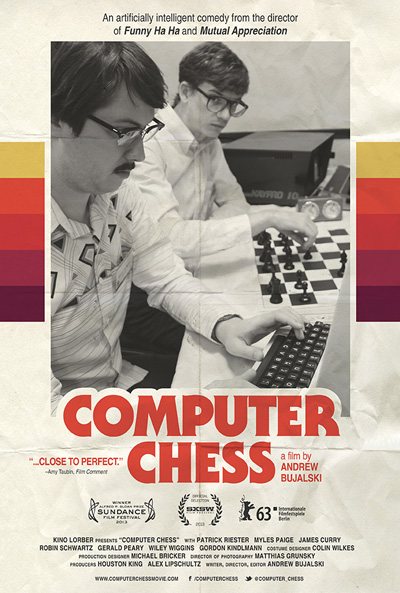'Computer Chess' Is A Movie For The Nerd In All Of Us
By Rob Christopher in Arts & Entertainment on Sep 27, 2013 3:00PM
 For his fourth feature film, Andrew Bujalski has boldly gone where few microbudgeted movies have dared: back in time. For the most part, his lo-fi filmmaking peers are content to tease apart the "here and now" of contemporary twentysomething (and occasionally thirty-something) characters; boiled down to clichés, they're overeducated, underemployed, romantically confused. "Surprise!" says Bujalski; in best period piece fashion, Computer Chess journeys back to the early 1980s and shows how similar things were back then (polyester suits and tie clips notwithstanding).
For his fourth feature film, Andrew Bujalski has boldly gone where few microbudgeted movies have dared: back in time. For the most part, his lo-fi filmmaking peers are content to tease apart the "here and now" of contemporary twentysomething (and occasionally thirty-something) characters; boiled down to clichés, they're overeducated, underemployed, romantically confused. "Surprise!" says Bujalski; in best period piece fashion, Computer Chess journeys back to the early 1980s and shows how similar things were back then (polyester suits and tie clips notwithstanding).
At a nondescript hotel, a group of computer nerds from both academia and the private sector has come together for their annual competition, pitting their programs against one another to battle for for the title of chessmaster. The winning program will then go up against the event organizer, played by Gerald Peary. He's never lost a game against a computer but reckons it'll happen "by 1984."
The story, such as it is, involves the interactions among the assemblage of freaks and geeks at the competition. (And just to make things interesting, there's also a swinging "couples encounter" group headquartered at the hotel too.) It's oddly reminiscent of Robert Altman's obscure 1979 satire H.E.A.L.T.H. which likewise revolves around a convention at a hotel. Like Altman, Bujalski's method is to assemble a bunch of interesting characters and watch them bounce off each other like molecules in a closed system. Or, as one character memorably puts it, like pieces on a chessboard. There's the British computer nerd (James Curry), the asshole interloper (Myles Paige), and the lone female participant (Robin Schwartz). And there's Peter (Patrick Riester), an earnest, painfully awkward young programmer who begins to think his program is actually manifesting intelligence. Wiley Wiggins is very funny as Peter's by-the-book cohort.
But storytelling per se is not really what this movie is about. Instead, Bujalski concentrates on recreating a milieu down to the last detail. The end result feels so stunningly accurate that for me, a child of the 80s, watching the movie was akin to a 90-minute long sense memory. The clothes, hairstyles, furnishings are all spot on, from eyeglass frames to the shape of the coffee cups and the wall decorations in the hotel rooms. And of course the computers, some borrowed from private collections and others from the Goodwill Computer Museum. Cinematographer Matthias Grunsky contributes the masterstroke: retrofitting a Sony AVC-3260 video camera (a black and white, analog tube-based system) to shoot with, giving the movie a fascinating "time capsule" feel. Both aesthetically and otherwise, Computer Chess is delightful from start to finish. Bujalski has appropriated yesteryear's obsolete technology to make this year's freshest movie.
Computer Chess opens tonight at the Music Box. Writer-director Andrew Bujalski, local stars Gordon Kindlmann and Anne Dodge, Chicago-born producer Alex Lipschultz and special guests will introduce and conduct post-show discussions tonight and Saturday.